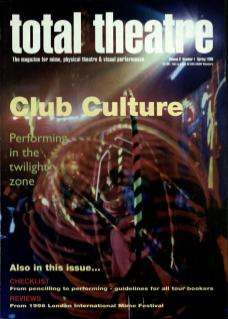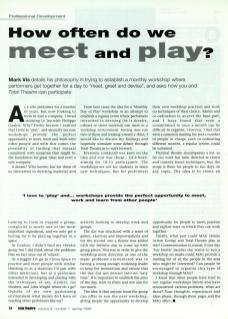As a solo performer for a number of years, but now looking to form or join a company, I loved studying Le Jeu with Philippe Gaulier. Why? Firstly because I realised that I love to 'play', and secondly because workshops provide the perfect opportunity to meet, learn and work with other people and with this comes the possibility of finding that natural complicité with someone that might be the foundation for great ideas and even a new company.
A dream? Who knows, but for those of us interested in devising material and looking to form or expand a group, complicité is surely one of the most important ingredients, and we only get a feeling for it by playing together in a space.
At Gaulier, I didn't find my theatre group but I did think about the problems that we face once out of 'school'. As a juggler I'd go to Circus Space to practise and meet people with similar thinking or as a musician I'd jam with other musicians, but as a performer interested in developing and playing with the techniques of say, Gaulier, Jos Houben, and John Wright where do I go? Outside of my own performing environment what means do I have of meeting other performers like me?
From here came the idea for a 'Monthly Day of Play' workshop in an attempt to establish a regular event where performers interested in devising (be it theatre, cabaret or street material) can meet in a workshop environment. Having now run two of these and looking toward a third, I would like to discuss my findings and hopefully stimulate some debate through Total Theatre as to ways forward. Everyone contacted was keen on the idea and cost was cheap – £4 a head, aiming for 10-15 participants. The workshops are not for students to learn new techniques, but for performers actively looking to develop work and groups.
The day was structured with a series of games, exercises and improvisations, and for the second one a theme was added with the definite aim to come up with group pieces. This was in order to give the workshop more direction as one of the main problems encountered was in having a strong enough workshop leader to keep the momentum and ensure that the day did not detract into an 'easy time'. It is important to establish the aims of the day, stick to them and not aim for too much.
The idea is that anyone from the group can offer to run the next workshop, giving people the opportunity to develop their own workshop practices and work on techniques of their choice. Admin and coordination is, as ever, the hard part, and I have found that even a commitment to once a month can be difficult to organise. However, I feel that with a common mailing list and a number of people in charge, each coordinating different months, a regular system could be sustained.
Physical theatre encompasses a lot – so far our work has been directed at clown and comedy based techniques, but the scope is there for people to run days on any topic. The idea is to create an opportunity for people to meet, practice and explore ways in which they can work together.
Finally, what part could MAG (Mime Action Group) and Total Theatre play in this? Communication is crucial, if one day 'Sue Smith' decides she wants to run a workshop on masks could MAG provide a mailing list of all the people in the area who might be interested? Can people be encouraged to organise this type of workshop through MAG?
I know that other people have tried to run regular workshops before and have encountered various problems, what are these? Your thoughts, experiences and ideas please, through these pages and the MAG office.

